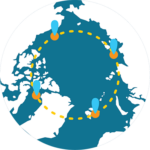© Elisabeth Kruger / WWF
Arctic Council Scorecard 2019
The 2019 Arctic Council Conservation Scorecard examines the concrete actions Arctic states are taking to fulfil their responsibilities as the primary stewards of the region.
The Arctic Ocean is warming, causing acidification. Caribou herds, once vast, are shrinking, and conflict between humans and polar bears is rising. The cascading impacts of rapid climate change in the Arctic will continue unless Arctic states take bold actions to limit the pressures and stressors on the region’s biodiversity through good governance.
The success or failure of the Arctic Council depends upon each nation state’s ability to effectively implement the Council’s recommendations at home. WWF has produced this Scorecard to shed light on the Council’s ability to deliver good governance, greater environmental protection and sustainable development in the Arctic.
The 2019 Scorecard examines Arctic Council recommendations of crucial importance to the Arctic environment by focusing on the progress that has been made by each individual government and highlighting where states need to work harder to fulfil their commitments. This is a followup to the 2017 Arctic Council Scorecard.
Key findings
- Arctic states performed well in using ecosystem-based management in their planning, but continued to make slow progress in safeguarding biodiversity and protecting conservation areas in the face of rising risks associated with climate change.
- Arctic states continued to show an unwillingness to recognize Indigenous peoples as full partners in managing the region.
- Arctic states must do more to identify threats to migratory species in the marine environment, including working toward establishing networks of marine protected areas.
- States received the worst scores in the regulation of Arctic marine shipping. States are not implementing measures to regulate shipping despite a clear need for better governance and coordination as the effects of climate change make Arctic shipping lanes more accessible.
- The 2019 Scorecard demonstrates a failure by Arctic states to recognize the growing industrial pressures in the Arctic Ocean and the risks these bring to biodiversity in the region. This is evident in the lack of governance in shipping combined with average scores on oil spill preparedness and response and prevention activities.
- Most Arctic states scored well in ensuring the completion of environmental impact and risk assessments prior to initiating industrial activities. However, WWF cautions that any new oil and gas developments in the Arctic come with a high degree of risk and are not consistent with achieving targets to limit warming to 1.5 degrees as outlined in the Paris Agreement.
Download
Overview Methodology and criteria Country profiles
For the full report and analysis, please contact us.
What we assessed
Ratings
Overall, the Scorecard shows Arctic states are not fulfilling their roles as the prime stewards of the region.
They must do more at the national level to follow up on their international commitments and coordinate more effectively with each other to provide a united Arctic position at relevant international fora and negotiations.
| Biodiversity | Conservation areas | Ecosystem-based Management | Black Carbon and Methane | Oil Spills | Shipping | OVERALL | |
| Canada |
C |
B |
A |
A |
A |
A |
B- |
| Kingdom of Denmark (Greenland & Faroe Islands) |
C |
D |
C |
C |
B |
D |
C- |
| Finland |
C |
B |
A |
B |
A |
B |
B+ |
| Iceland |
C |
B |
C |
C |
B |
D |
C+ |
| Norway |
C |
C |
A |
B |
B |
B |
B- |
| Russia |
C |
C |
C |
B |
C |
D |
C- |
| Sweden |
B |
B |
A |
A |
B |
A |
B+ |
| USA |
D |
C |
A |
C |
B |
D |
C+ |



